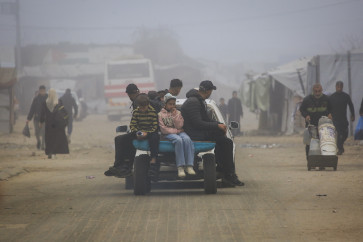Popular Reads
Top Results
Can't find what you're looking for?
View all search resultsPopular Reads
Top Results
Can't find what you're looking for?
View all search resultsOn Islamophobia Day
While religious hatred is indeed a widespread problem in many countries, Islamophobia holds a special place because Muslims are one of the few religious groups being directly attacked by political leaders around the globe.
Change text size
Gift Premium Articles
to Anyone
 People attend the Islamic Society of North America (ISNA) annual convention in Chicago, Illinois, the United States, on June 30, 2017. US Muslim leaders decried then-president Donald Trump's rhetoric toward Muslims and said his announced travel ban would be proven unlawful. US Muslims, who were gathered for the weekend convention in Chicago, also pointed to recent incidents of attacks against Muslims as evidence of increased Islamophobia. (AFP/Nova Safo)
People attend the Islamic Society of North America (ISNA) annual convention in Chicago, Illinois, the United States, on June 30, 2017. US Muslim leaders decried then-president Donald Trump's rhetoric toward Muslims and said his announced travel ban would be proven unlawful. US Muslims, who were gathered for the weekend convention in Chicago, also pointed to recent incidents of attacks against Muslims as evidence of increased Islamophobia. (AFP/Nova Safo)
I
was surprised to see Endy Bayuni's article in The Jakarta Post titled “International day to stem anti-Islamophobia may be counterproductive” on March 26, 2022. Referring to the designation of the International Day to Combat Islamophobia on March 15, the writer opined that singling out Islam may be counterproductive and possibly do a disservice to Islam.
While the author's right to hold his opinion cannot be questioned. I want to remind him that the 193 members of the United Nations adopted this resolution unanimously. It is no less useful to remember that international days are an advocacy tool to educate the public on issues of concern and to awaken or reinforce the political will to address challenging problems. Such days are celebrated by all stakeholders with a variety of awareness-raising actions.
There is a fundamental difference in the incidences of bigotry, hatred and violence against Islam and other religions. While such incidences against other religions or their believers occur sparsely or at random; against Muslims and Islam, such incidences have become systemic and regular in many parts of the world.
Addressing the Human Rights Council in Geneva in March 2021, UN special rapporteur on freedom of religion or belief and independent rights expert Ahmed Shaheed stated that "Since the 9/11 terrorist attacks, institutional suspicion and fear of Muslims, and those perceived to be Muslim, has escalated to epidemic proportions".
Another worrisome development is that while religious hatred is indeed a widespread problem in many countries, Islamophobia holds a special place because Muslims are one of the few religious groups being directly attacked by political leaders around the globe, leading to the institutionalization of Islamophobia through new legislation and policies. In some countries, anti-immigration and anti-refugee rhetoric has taken an anti-Muslim overtone and often becomes the central theme of political campaigns.
Take the example of India's Citizenship Amendment Act (CAA), which targets Muslims on the basis of their faith so they are ineligible to be granted citizenship. Hijab bans in many western countries and in the Indian state of Karnataka are yet another manifestation of the state officially promoting Islamophobia, exposing Muslims to heightened violence. In many western countries, the leaders have acknowledged the phenomenon of Islamophobia and have resolved to root it out. Following the Quebec City Mosque attack in January, Canadian Prime Minister Justin Trudeau stated that “Islamophobia is unacceptable”.
Pakistan's spearheading of the campaign for the day was only natural as it is the second-largest Muslim country in the world after Indonesia. Moreover, Pakistan brought to the fore the collective voice of the Organization of Islamic Cooperation.
The observation of the new International Day to Combat Islamophobia is a major step in the right direction. It is an acknowledgment of the fact that Islamophobia is a reality that needs to be taken seriously.
Observing this day will make people, communities and nations conscious of the growing problem and the urgent need to take corrective measures at various levels.
***
The writer is Pakistan Ambassador to Indonesia.










